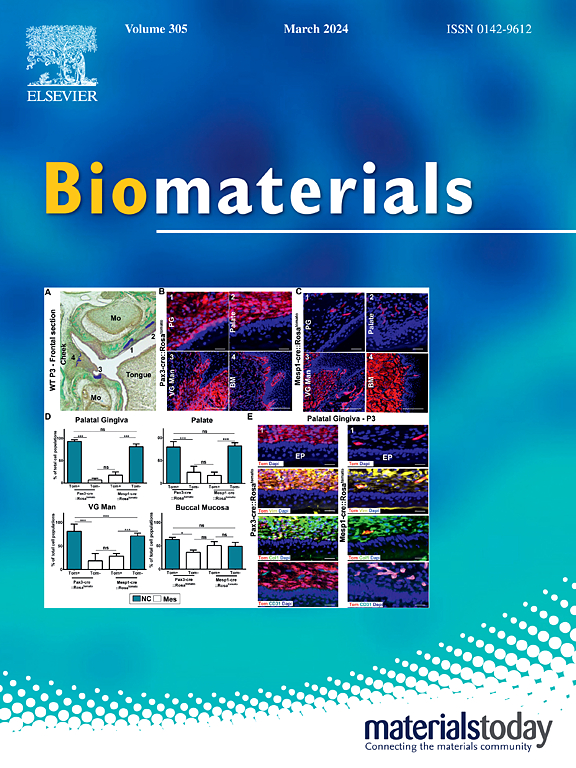DLL4/VEGF bispecific molecularly imprinted nanomissile for robust tumor therapy
IF 12.8
1区 医学
Q1 ENGINEERING, BIOMEDICAL
引用次数: 0
Abstract
Tumor-induced angiogenesis plays a pivotal role in the progression and expansion of solid tumors, making anti-angiogenic therapies a promising strategy in cancer treatment. However, compensatory angiogenesis, which can drive drug resistance and tumor recurrence, poses significant challenges in anti-angiogenic therapy. Therefore, improved anti-tumor angiogenesis therapy has become a critical necessity. Herein, we present a bispecific molecularly imprinted nanomissile (bsMINM) engineered to simultaneously target and inhibit both vascular endothelial growth factor (VEGF) and Delta-like 4 (DLL4). By blocking these two pivotal signals in tumor angiogenesis, bsMINM offers a potent “one-stone-for-two-birds” strategy that markedly enhances anti-tumor angiogenesis. The bsMINM features tailor-made binding sites for the N-epitopes of both VEGF and DLL4. This design allows bsMINM to persist at tumor sites effectively and diminish the negative feedback loop between VEGF and DLL4. The bsMINM inhibits VEGF-VEGFR signaling pathway in vascular endothelial cells and DLL4-Notch signaling pathway in both vascular endothelial cells and tumor cells, resulting in significant anti-tumor angiogenesis and growth inhibition. In the MCF-7 xenograft model, bsMINM exhibited a notable efficacy in restraining tumor progression while concurrently diminishing the self-renewal potential of cancer cells. This study pioneers the construction of the first bsMINM with inherent, enhanced anti-angiogenic effects achieved through dual blockades. The platform's bispecific recognition capability opens a new avenue for tumor treatment and shows significant promise in addressing issues caused by signaling pathway compensation.
DLL4/VEGF双特异性分子印迹纳米导弹用于肿瘤治疗
肿瘤诱导的血管生成在实体瘤的进展和扩张中起着关键作用,使抗血管生成治疗成为一种很有前途的癌症治疗策略。然而,代偿性血管生成可导致耐药和肿瘤复发,这对抗血管生成治疗提出了重大挑战。因此,改进抗肿瘤血管生成疗法已成为当务之急。在此,我们提出了一种双特异性分子印迹纳米导弹(bsmmin),它可以同时靶向和抑制血管内皮生长因子(VEGF)和δ -样4 (DLL4)。通过阻断肿瘤血管生成中的这两个关键信号,bsmmin提供了一种有效的“一石二鸟”策略,显着增强抗肿瘤血管生成。bsmminm具有为VEGF和DLL4的n -表位定制的结合位点。这种设计允许bsmmin有效地在肿瘤部位持续存在,并减少VEGF和DLL4之间的负反馈回路。bsmminm抑制血管内皮细胞中的VEGF-VEGFR信号通路和血管内皮细胞和肿瘤细胞中的DLL4-Notch信号通路,产生明显的抗肿瘤血管生成和生长抑制作用。在MCF-7异种移植模型中,bsmminm在抑制肿瘤进展的同时,也降低了癌细胞的自我更新潜力。本研究率先构建了首个通过双重阻断实现固有的增强抗血管生成作用的bsMINM。该平台的双特异性识别能力为肿瘤治疗开辟了新的途径,并在解决信号通路补偿引起的问题方面显示出巨大的希望。
本文章由计算机程序翻译,如有差异,请以英文原文为准。
求助全文
约1分钟内获得全文
求助全文
来源期刊

Biomaterials
工程技术-材料科学:生物材料
CiteScore
26.00
自引率
2.90%
发文量
565
审稿时长
46 days
期刊介绍:
Biomaterials is an international journal covering the science and clinical application of biomaterials. A biomaterial is now defined as a substance that has been engineered to take a form which, alone or as part of a complex system, is used to direct, by control of interactions with components of living systems, the course of any therapeutic or diagnostic procedure. It is the aim of the journal to provide a peer-reviewed forum for the publication of original papers and authoritative review and opinion papers dealing with the most important issues facing the use of biomaterials in clinical practice. The scope of the journal covers the wide range of physical, biological and chemical sciences that underpin the design of biomaterials and the clinical disciplines in which they are used. These sciences include polymer synthesis and characterization, drug and gene vector design, the biology of the host response, immunology and toxicology and self assembly at the nanoscale. Clinical applications include the therapies of medical technology and regenerative medicine in all clinical disciplines, and diagnostic systems that reply on innovative contrast and sensing agents. The journal is relevant to areas such as cancer diagnosis and therapy, implantable devices, drug delivery systems, gene vectors, bionanotechnology and tissue engineering.
 求助内容:
求助内容: 应助结果提醒方式:
应助结果提醒方式:


